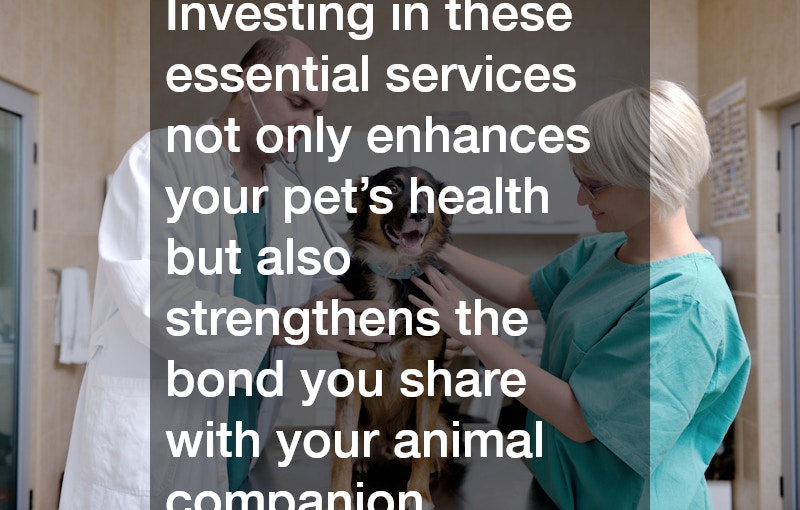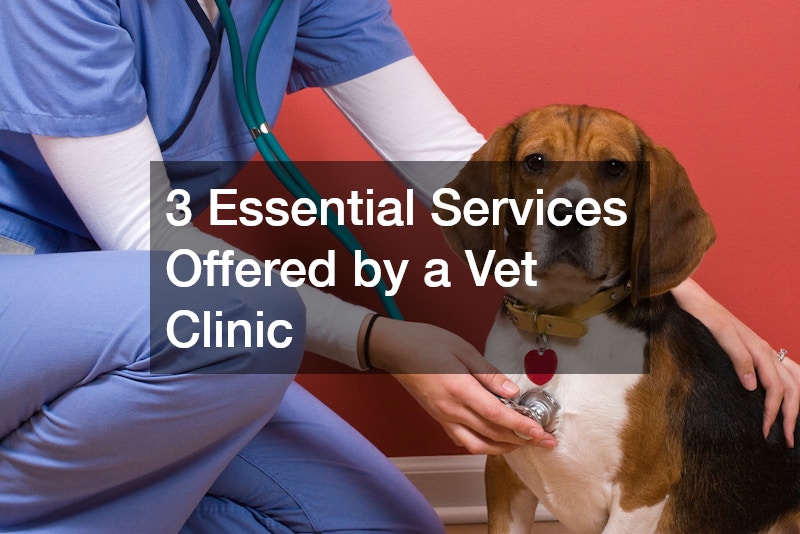Vet clinics are more than just places where pets get their annual check-up—they are comprehensive healthcare hubs designed to support the wellbeing of animals throughout every stage of life. From preventative care to emergency support, vet clinics play a vital role in ensuring that our furry, feathered and scaly companions receive the highest standard of care. Understanding the core services these clinics offer can help pet owners make informed decisions and foster long, healthy lives for their pets.
1. Preventative Health Care & Vaccinations
Preventative healthcare is arguably the most critical service offered by a vet clinic. Rather than waiting for illness to strike, preventative care focuses on avoiding disease altogether. This proactive approach not only saves pet owners from costly treatments in the long run but also contributes to a higher quality of life for pets.
Routine Health Checks: Most vet clinics recommend annual or biannual health check-ups depending on the age and condition of the animal. These comprehensive examinations allow vets to detect early signs of health issues such as dental disease, obesity, arthritis, or heart conditions. Early detection often leads to more effective and less invasive treatment.
Vaccination Programs: Vaccinations are crucial for protecting pets against common and potentially fatal diseases. For dogs, vaccines often include protection against distemper, parvovirus and kennel cough, while cats may require immunisation against feline herpesvirus, calicivirus and feline leukaemia. Vet clinics create tailored vaccination schedules based on the pet’s age, lifestyle and exposure risks.
Parasite Control: Fleas, ticks, heartworms and intestinal worms can severely impact your pet’s health. Vet clinics offer a variety of parasite prevention options including topical treatments, oral medications and injectables. Regular parasite control not only protects pets but also helps minimise zoonotic risks to human household members.
By prioritising preventative health care, vet clinics act as the first line of defence in protecting pets against disease and discomfort.
2. Diagnostic & Surgical Services
When a pet falls ill or sustains an injury, access to professional diagnostic and surgical services can be life-saving. Modern vet clinics are equipped with advanced technology and skilled professionals who can quickly identify and treat a wide range of health conditions.
Diagnostic Imaging and Laboratory Tests: Many clinics offer on-site X-rays, ultrasounds and blood analysis. These tools enable vets to diagnose conditions such as fractures, tumours, organ dysfunction and infections with precision and speed. In-house diagnostics often lead to faster treatment and better outcomes for pets.
Surgical Procedures: Vet clinics commonly perform both routine and complex surgeries. Desexing (spaying and neutering) is one of the most frequently performed operations and provides multiple benefits, including behavioural improvements and a reduced risk of certain cancers. Other common procedures include tumour removal, wound repair, dental surgery and gastrointestinal operations.
Post-Surgical Care and Recovery Plans: Following surgery, vet clinics offer comprehensive aftercare services to ensure pets recover safely and comfortably. This may include pain management, dietary guidance, wound care and follow-up appointments.
Having a vet clinic that offers these services under one roof provides peace of mind and ensures that pets receive timely and coordinated care in times of need.
3. Behavioural Advice & Nutritional Support
Physical health is only one aspect of a pet’s overall wellbeing. Mental stimulation, proper behaviour and a balanced diet are equally important. Vet clinics often provide educational resources and consultations to support pet owners in these areas.
Behavioural Assessments: Whether it’s a dog struggling with separation anxiety or a cat displaying aggressive tendencies, behavioural issues can impact both pet and owner. Vets can help identify the underlying causes and recommend strategies or refer to qualified animal behaviourists. Early intervention often leads to more effective long-term solutions.
Nutritional Consultations: With an overwhelming array of pet food options on the market, choosing the right diet can be confusing. Vet clinics offer tailored nutritional advice based on factors like breed, age, activity level and medical conditions. In some cases, prescription diets may be recommended to manage issues such as obesity, kidney disease, or food allergies.
By offering holistic services that address both mind and body, a vet clinic becomes an invaluable partner in nurturing a pet’s overall wellness.
Choosing the right vet clinic is one of the most important decisions a pet owner can make. With services ranging from preventative care and surgical intervention to behavioural and nutritional guidance, vet clinics are well-equipped to manage the diverse needs of pets across their lifespans.
Whether you’re visiting for a routine vaccination or an unexpected emergency, knowing your local vet clinic offers comprehensive, compassionate and professional care can make all the difference. Investing in these essential services not only enhances your pet’s health but also strengthens the bond you share with your animal companion.
.



